- Home
- James A. Michener
Space: A Novel
Space: A Novel Read online
Space is a work of historical fiction. Apart from the well-known actual people, events, and locales that figure in the narrative, all names, characters, places, and incidents are the products of the author’s imagination or are used fictitiously. Any resemblance to current events or locales, or to living persons, is entirely coincidental.
2014 Dial Press Trade Paperback Edition
Copyright © 1982 by James A. Michener
All rights reserved.
Published in the United States by Dial Press Trade Paperbacks, an imprint of Random House, a division of Random House LLC, a Penguin Random House Company, New York.
DIAL PRESS and the HOUSE colophon are registered trademarks of Random House LLC.
Originally published in hardcover in the United States by Random House, an imprint and division of Random House LLC, in 1982.
eBook ISBN 978-0-8041-5143-6
www.dialpress.com
v3.1
CONTENTS
Cover
Title Page
Copyright
Map
I. FOUR MEN
II. FOUR WOMEN
III. KOREA
IV. PAX RIVER
V. INTELLECTUAL DECISIONS
VI. TWINS
VII. THE MOON
VIII. REAL TIME
IX. DARK SIDE OF THE MOON
X. MARS
XI. THE RINGS OF SATURN
The Four Families
The Solid Six Astronauts
The Others
Acknowledgments
Other Books by This Author
About the Author
This is a novel and to construe it as anything else would be a mistake. The Mott, Grant, Pope and Kolff families are imaginary and are based upon no real prototypes. The Solid Six group of astronauts did not exist, nor was there any Gemini 13 or Apollo 18.
However, the great NASA bases, the Patuxent River experience, the battle operations in Korea and the general activities of the astronauts are realistically presented.
Certain historical personages do appear briefly, such as Lyndon B. Johnson, President Eisenhower, Secretary Wilson, the astronauts Deke Slayton and Mike Collins, and the scientists Jack Eddy, John Houbolt and Carl Sagan, but they are not given fictitious roles or inflated speeches.
The Battle of Leyte Gulf and the behavior of the admirals, American and Japanese, are faithfully reported. There was no destroyer escort Lucas Dean, but there were warships like it, and its exploits are not exaggerated. The major bombing of Peenemünde occurred as stated in August 1943 and was an exclusive British affair, but there were follow-up bombings the next year and I have expanded one of these. Generals Breutzl and Funkhauser are imaginary, but of course, Wernher Von Braun was real and even more powerful and impressive than I state.
On 24 October 1944 planet Earth was following its orbit about the sun as it has obediently done for nearly five billion years. It moved at the stunning speed of sixty-six thousand miles an hour, and in doing so, created the seasons. In the northern hemisphere it was a burnished autumn; in the southern, a burgeoning spring.
At the same time, the Earth revolved on its axis at a speed of more than a thousand miles an hour at the equator, turning from west to east, and this produced day and night.
As a new day broke over the Philippine Islands, two navy men, one Japanese, one American, were about to perform acts of such valor that they would be remembered whenever the historic battles of the sea were compared and evaluated.
Later, when the ceaseless turning of the Earth brought high noon to the island town of Peenemünde on Germany’s Baltic coast, a small, quiet mechanical genius working for Adolf Hitler would find himself in the middle of an ordinary day which would have a most extraordinary conclusion.
A few hours following, when midafternoon reached London, a youthful American engineer, not in uniform, would see for himself the power of Hitler’s vengeance weapon, the A-4, and would take steps to destroy it but not its makers, because even then the American government could foresee that when the war ended, they would need these German scientists.
And toward the close of that long day, when the Earth had revolved the western region of America into the hours of sunset, in a small city in the state of Fremont a boy of seventeen would experience three resplendent moments, and would realize as they were happening that they were special in a way that might never be exceeded.
In the early afternoon of that October Tuesday, Stanley Mott, an American civilian twenty-six years old, displayed a sense of almost frantic urgency as he watched the radar screen at a tracking station thirteen miles south of London.
‘It’s coming!’ an English sergeant cried, trying vainly to keep the excitement out of his voice. And there on the screen, as Mott watched, the sinister signal showed, a supersonic, unmanned monster bomb coming at London from some undetermined spot in Holland.
Even on the radar it displayed its silent speed, more than two thousand miles an hour. It would not be heard at this station until some moments after it had passed. Then sonic booms would thunder through the air, reassuring the listeners that this bomb at least had passed them by. ‘If you hear it,’ the sergeant explained to Mott, ‘it’s already gone.’
In the fragile moments of final silence, everyone in the room listened intently for the tremendous sound which would indicate that the rocket bomb had struck, and sensitive devices were pointed toward London. K-k-k-krash! The bomb had fallen. The listeners turned antenna to new directions and soon an ashen-faced young man from Oxford University announced: ‘The heart of London. But I do believe east of Trafalgar Square.’
‘Hurry!’ Mott snapped, and within three minutes he and the Oxford man and a driver were speeding toward London with a set of red cards showing on their windshield, allowing them to pass roadblocks and salute policemen who barred certain thoroughfares. ‘Bomb squad,’ the Oxford man called as the car sped past. This was not exactly true. He and Mott were not qualified to defuse unexploded bombs, as the real squad did; they collected data on the damage inflicted by these new and terrible bombs which Hitler was throwing at London in what he boasted was ‘our act of final revenge.’
From the manner in which confusion grew as the car approached the area leading to Trafalgar Square, it was apparent that the trackers had been correct; the rocket had landed in the vicinity but well to the east. This was confirmed when wardens shouted, ‘It landed in the City.’
Then apprehension doubled, for this meant that the crucial business heart of London, termed the City, was once more in peril. The Bank of England, St. Paul’s, the Guildhall, from which Churchill spoke—how Hitler would gloat if his spies wirelessed tonight that one of these enticing targets had been struck, how smug Lord Haw-Haw would sound as he ticked off the losses on the midnight radio.
But when the weaving car entered Cheapside—with the driver crying ‘Bomb squad! Bomb squad!’—Mott and the Oxford man saw with relief that the symbolic targets had once more been miraculously spared, but this discovery gave them short comfort, since they must now inspect the hideous consequences of wherever the bomb had fallen.
‘Many lives gone this time,’ muttered an elderly warden with pale face and drooping mustaches. He led the way through to a gaping hole where a short time before a small news kiosk had served businessmen working in the City. It and the shops near it had been eliminated—erased and fragmented as if made of sticks—with all their clerks and customers dead.
‘I don’t know which is worse,’ Mott said to the Oxford man. ‘That ghastly hole in the ground or the splinters of wood and bone.’
‘Thank God, that monster in Berlin doesn’t have fifty of these to send at us every day,’ the English expert muttered.
‘How many have hit London?’ Mo
tt asked.
‘If my count is correct, this is only number seventy-three. Since September, when they started. Something’s badly wrong with the German supply system.’
‘Our bombing of Peenemünde is what’s wrong,’ Mott said. ‘Your boys have wrecked their hatching ground.’
‘Let’s be grateful for that,’ the Englishman sighed as he poked among the wreckage for any shreds of the bomb. His team was still not quite certain how the horrible thing operated. ‘You know, Mott, before they started to arrive, we calculated Hitler could throw a hundred a day right at the heart of London. One hundred thousand civilians dead each month. We’ve been lucky. We’ve been terribly lucky.’
‘How many dead here?’
The two experts consulted with wardens and came up with a figure of less than fifty, and when Mott repeated the number, almost with a sense of gratification, the Oxford man gave a convulsive sob. ‘Look at one of the fifty,’ and he pointed to the body of a young girl who had been serving in the shop of a tobacconist. She was torn apart, but her head was untouched and her pretty face was still smiling, or so it seemed.
Mott looked away. Seeking out a member of the real bomb squad, he asked professionally, ‘Did you recover any metal parts? Any at all?’
‘Total fragmentation,’ the man said.
‘Damn. Always we work in the dark.’ He kicked at some rubble, gave a last survey of the wreckage, and stepped aside as hospital orderlies moved in to start recovering bodies.
‘Shall we go on to Medmenham?’ the Oxford man asked.
‘That we shall,’ Mott said. ‘We’ll hit those Nazis tonight with such a rain of destruction they’ll forget London.’ He looked up at the sky and said, ‘Moonlight will be good till ten o’clock. Stand back, Hitler, you bastard.’
They sped from London on an emergency route leading to the west, and three times they crossed the winding River Thames, beautiful in its autumn coloring, with great trees crowding its rural banks. Heading in the direction of Windsor Castle and Eton, they could make excellent time, since the roads were free of traffic, and soon they were turning off onto a country lane that led to a remarkable site at which a remarkable meeting was about to take place.
Medmenham, a rustic village, was the site of England’s ingenious Air Force Signal Center, where data on the bombing of Germany were evaluated. Some of the brightest men and women in the world, English mostly but with a cadre of Americans and French, grabbed at aerial photographs as the plane crews delivered them and then made sophisticated calculations of the damage that had been inflicted. At Medmenham, as one watched these clever people at work, one got the feeling of a Germany that was being slowly strangled and reduced to rubble.
Tonight, the brightest of the Allied minds had assembled in a temporary shed to study just one set of photographs: those showing the German rocket site at Peenemünde, in former times a trivial summer resort located on a small island facing the Baltic Sea. If the German wizards at Peenemünde were allowed to proceed freely with their experiments and their manufacturing genius, London would be destroyed—and after that, New York and Washington.
‘It could be the major target in the world,’ an American Air Force general was saying when Stanley Mott joined the group. ‘What’s the word from Washington?’
‘I bring a straightforward commission. Peenemünde is to be erased. Forget the other targets.’
‘That we can’t do,’ an English general interrupted. ‘You Americans with your heavy bombers are free to go at Peenemünde. We encourage you to strike at the breeding ground. But we British, with London in such peril … We must try to eliminate the actual launch sites. What news of the latest rockets?’
Mott said, ‘About an hour ago one landed in Cheapside. Almost equidistant from the Bank of England, St. Paul’s and the Guildhall. Hit a tobacconist’s.’
‘God must be with us,’ the general said, then quickly: ‘How many dead?’
‘Less than fifty.’
The room fell silent. These men knew what the word fifty meant, the tragic reverberations outward to the families of the dead.
‘So you will appreciate,’ the English general said, ‘when I insist that we must continue to seek out and destroy the launching sites.’
The American general, who seemed to be acting as chairman of the meeting, nodded. ‘You do your job, we’ll do ours. And tonight ours is Peenemünde.’
‘Before we start on that,’ an English civilian said, ‘I’d like to show you these latest photographs of the area just north of The Hague. This little town is Wassenaar, and we feel sure that those shadows indicate a rocket-launching site. If we can knock that out within the next few days, we think we can drive the rocket operation back out of London range.’
‘What is the effective range?’
‘We don’t know, of course, but we calculate two hundred and twenty miles, maximum.’
A different American general asked contemptuously, ‘You mean Hitler has wasted all his energy—Peenemünde … the whole snakes’ nest—on a rocket that can strike only two hundred miles? The man must be an idiot.’
‘We know he’s an idiot,’ the English general said, ‘but a damned lethal one. Our planes must concentrate on Wassenaar.’
An English civilian coughed. ‘There’s a problem. Wassenaar is a residential town. If we saturate …’
‘I know,’ the English general said. ‘I know damned well what the problem is, and frankly, it’s a cruel one. Advice?’
A different civilian interrupted an officer who was about to respond: ‘We’ve consulted the Dutch government—secretly, of course. One of their men is waiting outside.’
‘Bring him in,’ the American general said.
A fifty-year-old Dutchman appeared in civilian clothes. Seeing the generals, he saluted. ‘My name is Hegener. I go in and out of the Netherlands. Regularly …’
Mott thought: It’s like saying I go in and out of New York. Regularly. By the Hudson Tunnel. But what a hell of a difference. He wondered how Hegener went in and out. In by parachute? Out by darkened motorboat?
‘My government has studied the problem,’ Hegener said, ‘and we believe Wassenaar must be saturated.’
No one spoke. There was nothing to be said. Permission had been granted to take radical steps that might save the English city of London, but everyone in the room knew what penalties the Dutch town of Wassenaar must pay. It was a total war, which these men were determined to win because to lose would mean total hell. And now Wassenaar had moved into the front lines.
‘Thank you, Mr. Hegener,’ someone said, and the Dutchman rose to go.
‘Do you live near Wassenaar?’ an American asked.
‘Oh no! I live well to the north in a fishing village on Texel. But it would be the same.’
When he was gone, the American general said, ‘Agreed. Your planes to knock out Wassenaar. Ours to take care of Peenemünde. And we start tonight.’
‘Is the raid set for tonight?’ Mott asked. He seemed unusually young to be questioning a four-star general, but he worked in a field of such recent origin that most of its practitioners were young. Mott, for example, was by no means an expert in either rocketry or the work being done in atoms, but he was a solid engineer with a marked capacity for adjusting to any radical scientific developments.
‘Yes, we’re launching three hundred and ninety-four bombers at Peenemünde at 2100 hours. From sixteen different airfields. Led by four highly trained British pathfinders who’ve been there before. Tonight we knock out Herr Hitler’s rocketry.’
This news presented Mott with so many problems that for the moment he could not sort them out, so he sat silent, studying his fingertips. He was about to ask that the room be cleared of all but the very top generals and experts, when the British leader said brightly, ‘Gentlemen, I believe they’re ready for us at the mess. To those of you who haven’t been here before, we have a surprise in store. Fletcher, will you explain?’
As the men gathered their papers, al
most every one top secret, an attractive woman in uniform stepped forward and said in beautifully arranged words, ‘A patriotic gentleman has given us his estate for our mess. Danesfield his house is called, just a stone’s throw down there. It’s rather something and not at all what we have regularly, I assure you. It was built in the 1890s by a Mr. Hudson, who had the good fortune to invent and sell our most popular soap, Sunlight.’ At this name several men chuckled.
‘When Mr. Hudson grew tired of his mansion, he passed it along to a Mr. Gorton, who was also lucky. He invented and sold H. P. Sauce, and he was even richer than Mr. Hudson. He had twenty-one gardeners and forty-six servants. Gentlemen, you are going to dine in one of the stately homes of England.’
Stanley Mott, son of a Methodist minister in a small New England city and a graduate of Georgia Tech, was not prepared for Danesfield. The gray-stone building was immense, with a garage area larger than most mansions; ten apartments stood over what had been the stables; they were now occupied by Air Force drivers and mechanics. The hall itself contained forty-six bedrooms, in which the bright young men of the Signal Center slept, but it was the pair of rooms in which the officers would dine that stunned the Americans.
The first, a kind of reception-hall–dance-hall–living area, had a ceiling thirty feet high, a gigantic fireplace and a minstrels’ balcony from which a six-piece military band played English airs as if a duke and his duchess were entertaining in 1710. Officers assigned here led the visitors through this enormous room and into the dining hall, a place of such brilliance that Mott could merely shake his head in wonder.
It was sixty feet long, with a green marble fireplace at one end, each part carved like a work of art. One wall contained four enormous bay windows that gave a view of the Thames below, but the extraordinary feature was the dining table. It could seat as many as seventy if the chairs were close together, and every item on it seemed to gleam: the napery, the china, the silverware. Forty-six men and four women sat down to dinner, served by enlisted men who had been waiters in private life.

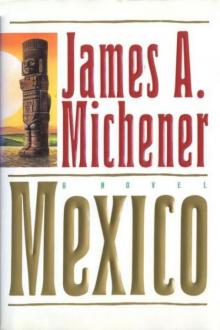 Mexico
Mexico The World Is My Home: A Memoir
The World Is My Home: A Memoir Sayonara
Sayonara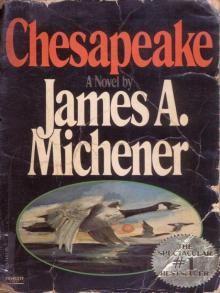 Chesapeake
Chesapeake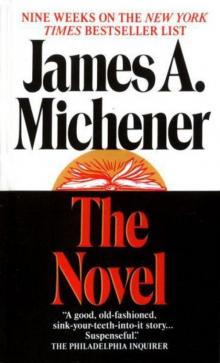 The Novel
The Novel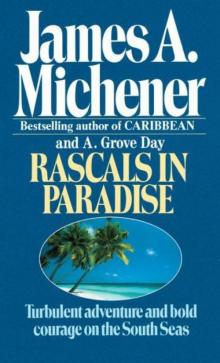 Rascals in Paradise
Rascals in Paradise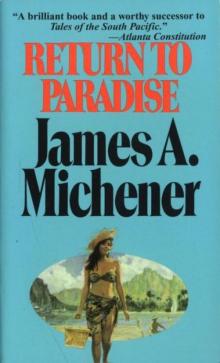 Return to Paradise
Return to Paradise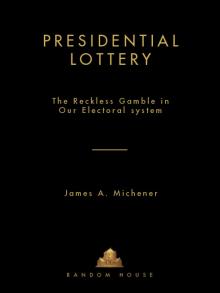 Presidential Lottery: The Reckless Gamble in Our Electoral System
Presidential Lottery: The Reckless Gamble in Our Electoral System The Source
The Source Poland
Poland Space
Space Caravans
Caravans Creatures of the Kingdom: Stories of Animals and Nature
Creatures of the Kingdom: Stories of Animals and Nature Iberia
Iberia Hawaii
Hawaii The Watermen: Selections From Chesapeake
The Watermen: Selections From Chesapeake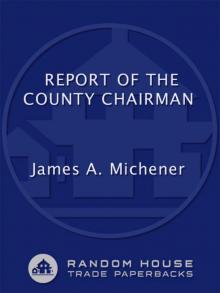 Report of the County Chairman
Report of the County Chairman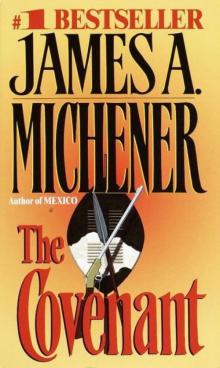 The Covenant
The Covenant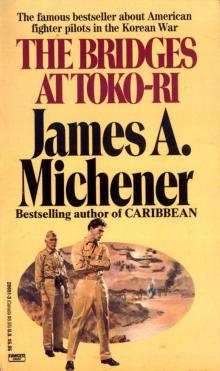 The Bridges at Toko-ri
The Bridges at Toko-ri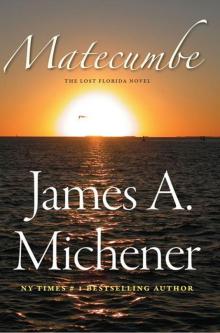 Matecumbe
Matecumbe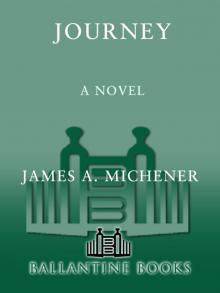 Journey: A Novel
Journey: A Novel Centennial
Centennial Sports in America
Sports in America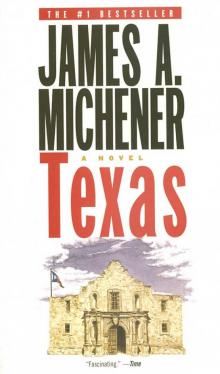 Texas
Texas Miracle in Seville
Miracle in Seville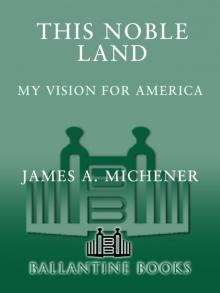 This Noble Land: My Vision for America
This Noble Land: My Vision for America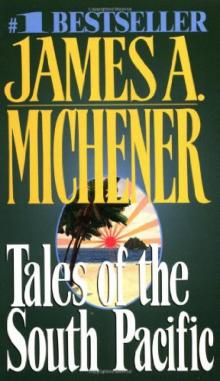 Tales of the South Pacific
Tales of the South Pacific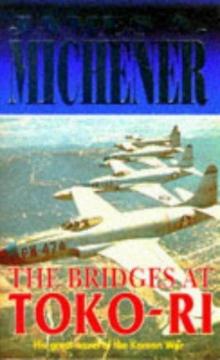 Bridges at Toko-Ri
Bridges at Toko-Ri Space: A Novel
Space: A Novel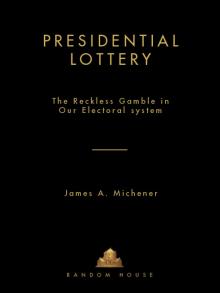 Presidential Lottery
Presidential Lottery Sayonara: A Novel
Sayonara: A Novel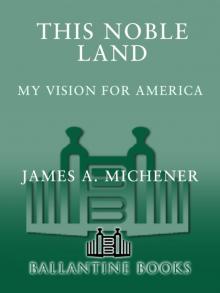 This Noble Land
This Noble Land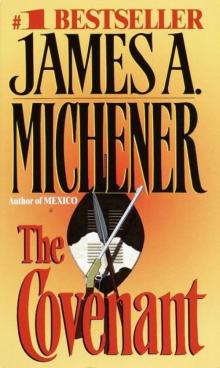 The Covenant: A Novel
The Covenant: A Novel Miracle in Seville: A Novel
Miracle in Seville: A Novel The Bridge at Andau
The Bridge at Andau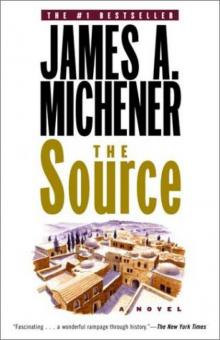 Source
Source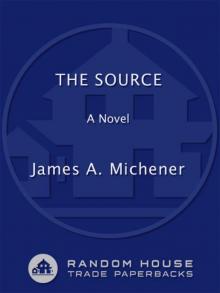 The Source: A Novel
The Source: A Novel Journey
Journey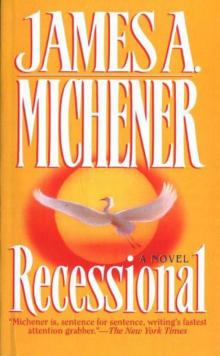 Recessional: A Novel
Recessional: A Novel Legacy: A Novel
Legacy: A Novel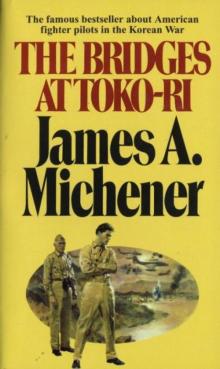 The Bridges at Toko-Ri: A Novel
The Bridges at Toko-Ri: A Novel Poland: A Novel
Poland: A Novel